新世纪高职高专英语第1册第1课
新世纪中职英语 第一册 Unit 1 Language Focus
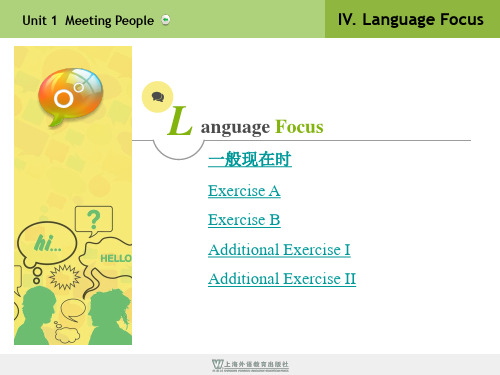
IV. Language Focus
英语中动词的常用时态有9种,其中一般现在时、一般过 去时和一般将来时最为常见。一般现在时的动词形式通常采用 原形,但当主语是第三人称单数时,加-s或-es,其规则与名词 由单数变成复数时相同。一般现在时主要用来表示现在经常性 或习惯性的动作与状态,例如: How are you? I’m fine. Li Yong and I get along very well. How often do you go to the United States? He plans to spend two days in Shanghai.
But she doesn’t like doing physical exercises in PE classes. She feels that they are boring! Her favorite subject is Science. It seems that the amazing and useful Science attracts her. She thinks she is on the way to be a scientist. She wishes to invent things to make the world more and more beautiful.
Unit 1 Meeting People
Multiple choice. Choose the best answer for each blank.
IV. Language Focus
In her free time,she often 3 to the beach. She loves just sitting around and talking to friends there. She’s getting better at understanding boys , but she hates listening to hours of talk about football. “4 not interesting at all!” she once 5 to me. That is my pen friend Alice. 5. A. say B. says C. sais D. said
新世纪高等院校英语专业写作教程第一册Unit-1-4课后答案
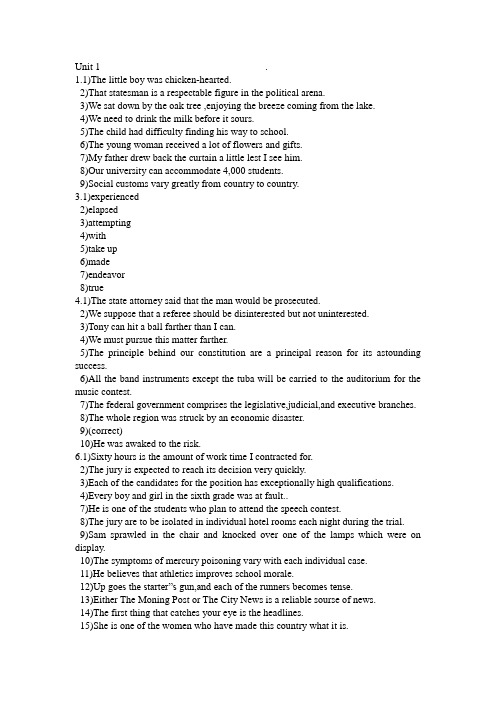
Unit 1 .1.1)The little boy was chicken-hearted.2)That statesman is a respectable figure in the political arena.3)We sat down by the oak tree ,enjoying the breeze coming from the lake.4)We need to drink the milk before it sours.5)The child had difficulty finding his way to school.6)The young woman received a lot of flowers and gifts.7)My father drew back the curtain a little lest I see him.8)Our university can accommodate 4,000 students.9)Social customs vary greatly from country to country.3.1)experienced2)elapsed3)attempting4)with5)take up6)made7)endeavor8)true4.1)The state attorney said that the man would be prosecuted.2)We suppose that a referee should be disinterested but not uninterested.3)Tony can hit a ball farther than I can.4)We must pursue this matter farther.5)The principle behind our constitution are a principal reason for its astounding success.6)All the band instruments except the tuba will be carried to the auditorium for the music contest.7)The federal government comprises the legislative,judicial,and executive branches.8)The whole region was struck by an economic disaster.9)(correct)10)He was awaked to the risk.6.1)Sixty hours is the amount of work time I contracted for.2)The jury is expected to reach its decision very quickly.3)Each of the candidates for the position has exceptionally high qualifications.4)Every boy and girl in the sixth grade was at fault..7)He is one of the students who plan to attend the speech contest.8)The jury are to be isolated in individual hotel rooms each night during the trial.9)Sam sprawled in the chair and knocked over one of the lamps which were on display.10)The symptoms of mercury poisoning vary with each individual case.11)He believes that athletics improves school morale.12)Up goes the starter”s gun,and each of the runners becomes tense.13)Either The Moning Post or The City News is a reliable sourse of news.14)The first thing that catches your eye is the headlines.15)She is one of the women who have made this country what it is.2.1)play a minor role/be a utility man2)That’s Greek to me.3)belated action/advice4)Where there is smoke there’s fire.5)an evil creature6)walk into the trap7)one’s face glowing with he alth3.1)We must practice economy./We must reduce unnecessary expenditures .2)It is essential to control environmental pollution.3)We must arrive at the station on time.4)Financial expenditures should be arranged in order of priority.5)We should speed up construction of urban housing so as to improve the housing conditions.6)To be allowed to make profits,private capital has to meet tow condition:1)the profits must belegal,and 2)they must not be excessive.7)During the period of the Eleventh Five-Year Plan we must never neglect grainproduction.Instead,we must steadily increase it.5.1)me 2)who 3)I4)me/myself 5)me 6)each other’s7)who 8)us 9)whom10)Some 11)one’s 12)His13)his 14)his,his1.1)When I was assigned a certain task,I did it to my best ability.2)Fog can cause blindness.3)Recently I joined a social club which raise money for the care of needychildren,and we meet every Wednesday afternoon.4)An eassy should be understandable to the reader.5)Many items are expensive at discount stores.6)Bears that have just come out of hibernation are usually hungry and dangerous.7)The author should have shortened the story by half.8)The city’s environmental surroundings are not the most comfortable.9)I learned certain facts that I believe are vital to every freshman.2.1)simmer:cook food gently at or just below boiling pointsauté:fry quickly in a little hot fatbake:cook by using direct heat in an oven2)Other verbs about cooking include roast,steam,braise,fly,deep-fly,boil,poach,scramble,grill,stew,curry,baste,barbecue.3.1)For dinner we had barbecued steaks and sweet corn.2)Last week my brother John joined an insurance company.3)He is not a friendly and easy-going colleague.4)Our view of the sea at sunset was splendid/breathtaking.5)It was a fine day to play outdoors.6)What impressed me most adout the city was the hustle in the streets.4.There are seize,hurl,choke,blind,leap,flee,etc.5.1)I admire Jenny’s long black glossy hair so much.2)The fearless explorer finally landed at the South Pole.3)Fast driving on a smooth road can be great fun.4)John and I often wrote each other long e-mails full of jokes.5)The pale skinny woman fainted suddenly.6.1)I invited the visiting professor to the English Club.2)Shooting stars warm us of catastrophe.3)The deleted sentence was unnecessary.4)Stephanie tiptoed up the carpeted steps.5)The students attending the art school are highly active.6)The dollar bill split in half was taped.7)Amy was the only winning contestant who was below 10.8)The freshly painted house shone in the sun7.1)indescribably 2)dark 3)occasional4)steadily 5)surely,bad 6)terribly8.1)At his mother’s request,he agreed to wait at least a year before getting married. 2)Halfa of the girls in town were in love with Ben,but he wanted to marry Christine only.3)John hopes that in the years to come he can be as successful as his father has been.4)The winner of the contest ate almost three dozen hamburgers.5)Debbie knew that chicken when fried always pleased ED.6)Mary could not resist the temptati on to whisper in her friend’s ear about what she had seen.Unit4p.544.1) lay-lie2) opened-opens3) lead-led4) were-are5) arrived-had arrived6) seemed-seems7) died-had died8) will x9) return-returns10) is-were11) is-were12) finds-find5.1) was attacked 2) robbed 3) was taken 4) released 5) spent 6) left 7) had promised 8) be 9) was walking 10) was attacked 11) described 12)took 13) containing 14) was (just) turning 15) occurred 16) saw 17) was happening 18) rushed 19) ran 20) warn 21) be 22) walk 23) had 24) commented 25) be。
新世纪中职英语 第一册 Unit 1 Reading
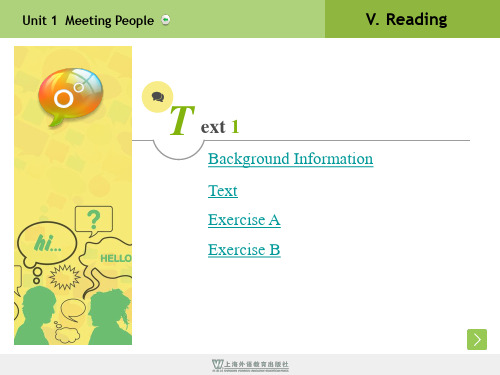
19:10
FM828
上海航空
首尔
浦东(T1)
上海浦东
Unit 1 Meeting People Text 原定抵达 时间
19:15
Text 1
航班号
航空公司 台湾复兴 航空 中国东方 航空 中国东方 航空
出发地
航站楼
20:00
CZ370
Seoul
Unit 1 Meeting People Text
Scheduled Arrival Time
Text 1
译
Flight
Airline
Origin
Terminal
Destination
Status
20:10
MU2544
China Eastern
Cheju
Pudong (T1)
1. When is Prof. Sanders scheduled to arrive at the airport? At 19:55.
2. What’s the flight number? VS250.
Unit 1 Meeting People
Text 1
A. Suppose you are Qian Lin or Cathy. Answer the following questions.
ARRIVED 19:06
Unit 1 Meeting People Text
Scheduled Arrival Time
Text 1
译
Flight
Airline
Origin
Terminal
新世纪高职英语课后答案Unit 1---7.doc

课后练习答案Unit1 第五页1-5 impression no more than contains established varied 6-10 process sustainable speed up worse still absorbed1-5 describe destroyed absorption process grow6-10 economy impressed containers renew variety翻译: 1. to cut down trees without permission2. varied between 4% and 6%3. to speed up the production of the new brand car4. is the same as ours5. worse still ,he was out of job第七页It is the director who is responsible for the accidentIt is jack who helped the old man to push his cartIt took the boy three hours to swim across the river.It took the doctors several hours to operate on this patientHe devoted all his time to writing fairy tales, so he remained single all his life.If you do not eat, you will have to remain hungry.As we mentioned just now, the problem is much more serious than you thoughtAs everybody knows, learning a foreign language takes much time第十页Accept receive received acceptLie laid lay lieAlone lonely lonely alone第十二页1.正确2.T hat—which3.W hich---that4.W ho---whom5.H e后加who6.W hich—whom7.W hich—where8.W hich—whose9.W hich—that10.H ouse后加In(1)w here(2)t hough(3)i t(4)a s(5)b ecause(6)i n(7)w ith(8)w ith(9)i f(10)gaveUnit 2 Capital citiesExercise I1. Washington,London,Ottawa, Canberra, Wellington2. earthquakes, diseases3. qualities4. advantages5. foreignExercise II1.is spoken of as2.leveled3.guard4.decaying5.associating6.peculiar7.are laid out8.ranks9.imitated10.imagineExercise III1. commerce2. present3. imitation4. association5. ambition6. glorious7. professional8. emperors9. imagination10. wonderfulExercise IV1.I found that the books were laid out neatly on the desk.2.We would like to thank all who had a share in this project.3.Their delay was due to bad weather.4.What influences people is not the past but the present andthe future.5.Generally speaking, people often associate politics withwars.6.Tom had a first-rate education, so he had an advantageover those children who were not as well educated as he.7.Many students complain that the food is by no meanssatisfactory.8.Their screams of excitement all but drowned out themusic.Exercise VModel 11.Most tourists speak of Guilin as an earthly paradise, abeautiful city on the Li River.2.People all over the world speak of Brazil as a dominantpower in soccer.Model 21.The air in a hilly region is cooler than that on plains.2.In my opinion, his misdoings are those of a fool.Model 31.A father should do whatever he can to make himselfworthy of the name of father.2.By doing so, he proved himself worthy of trust.Model 41.It would be worthwhile making such an experiment at thecost of so much money.2.It is worthwhile for the soldiers to fight or even die for thefreedom of their country.Use the right word1. able (be able to), capable (be capable of)A.ableB. capable of seatingC. able to comeD. capable of handling2. especially, speciallyA.especiallyB. speciallyC. speciallyD. especially3. compare, contrastpareB. comparedC. contrastsD. contrastsGrammar TipsI.1.which/that2.whom3.which4.where5.whom6.whose7.where8.that9.why10.whenII.1.choice2.mean3.that4.from5.been6.why7.their8.once9.so10.to11.All12.under13.over14.get15.right Practical reading⏹I: B E A C D⏹II: F F T F TPractical writing◆held at 4:30 p.m. on Wednesday, 10 October 2009 in theBeijing Conference Hall, Yangtze Tower, Pudong, Shanghai.(于2009年10月10日星期三下午4:30在上海浦东长江大厦北京厅举行。
高教版英语1(高职高专版)(第三版)课件unit 1
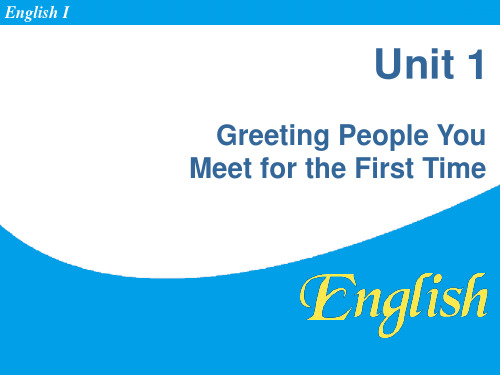
Unit 1 Greeting People You Meet for the First Time
Aims and Requirements Language Focus
Focal Function and Patterns
3) Hi! How are you? Hello! How are things with you? Hey! How are you doing?
English I
Unit 1
Greeting People You Meet for the First Time
高职高专英语1-第三版unit-1ppt课件
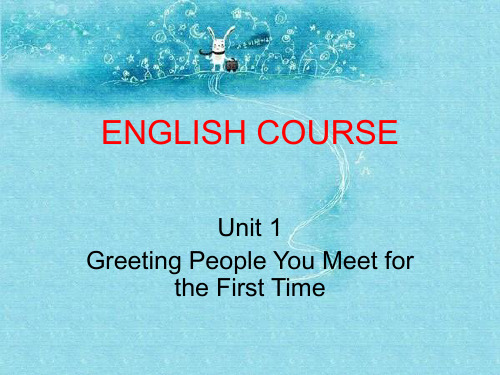
New Words and Phrases
• term
n. 术语;学期;期限;条款 vt. 把…叫做
e.g.: He failed no students this term.这学期他 没有给学生不及格。
• expert
adj. 熟练的;内行的;老练的 n. 专家;行家;能手 vt. 当专家;在…中当行家 e.g.: The expert elaborates his theory from his own reason. 这位专家详尽阐述他的学说。
New Words and Phrases
• professor n. 教授;教师;公开表示信仰的人
e.g. :The professor improvised a poem in the class. 教授在课堂上即兴创作了一首诗
• honor
n. 荣誉;信用;头衔 vt. 尊敬(等于honour);给…以荣誉 e.g. : Your honor brings to all of us. 你的荣誉给我们带来了荣耀。
ENGLISH COURSE
Unit 1 Greeting People You Meet for
the First Time
.
Dialogue A
• Receptionist: a person who receives people arriving in a hotel 接待员
• Technical: a. having special knowledge技 术的、工业的 \ technical school技术学 校
so involves the risk of failure 冒险(行动或事业) Joint venture 合资企业
新世纪新视野高职高专英语(电子教案)Unit1 ___
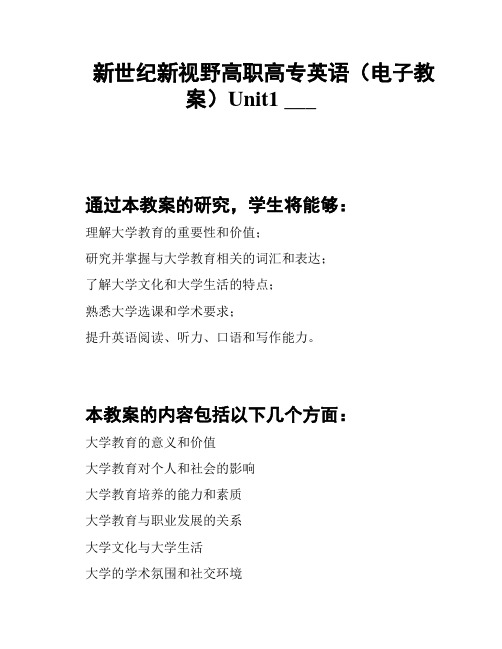
新世纪新视野高职高专英语(电子教
案)Unit1 ___
通过本教案的研究,学生将能够:
理解大学教育的重要性和价值;
研究并掌握与大学教育相关的词汇和表达;
了解大学文化和大学生活的特点;
熟悉大学选课和学术要求;
提升英语阅读、听力、口语和写作能力。
本教案的内容包括以下几个方面:
大学教育的意义和价值
大学教育对个人和社会的影响
大学教育培养的能力和素质
大学教育与职业发展的关系
大学文化与大学生活
大学的学术氛围和社交环境
大学生活的兴趣和挑战
大学生应如何适应大学生活
大学选课和学术要求
大学课程的分类和选择
大学学时、学分和学术成绩的要求大学学业的要求和规划
大学英语教育
大学英语教育的特点和目标
大学英语课程的设置和要求
大学英语研究和提高的方法
阅读和听力训练
阅读和听力的重要性和技巧
阅读和听力材料的选择和使用
阅读和听力练的方法和策略
阅读和听力练习的方法和策略。
新世纪高职英语第一册 Unit 1 Why College
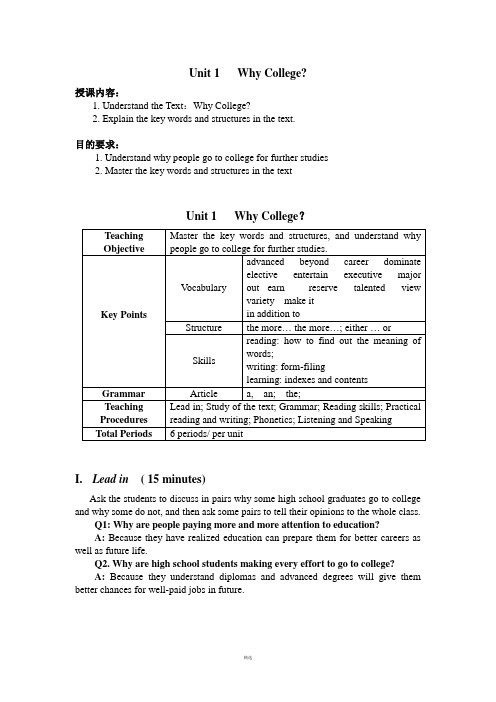
Unit 1 Why College?授课内容:1. Understand the Text:Why College?2. Explain the key words and structures in the text.目的要求:1. Understand why people go to college for further studies2. Master the key words and structures in the textUnit 1 Why College?I.Lead in( 15 minutes)Ask the students to discuss in pairs why some high school graduates go to college and why some do not, and then ask some pairs to tell their opinions to the whole class.Q1: Why are people paying more and more attention to education?A: Because they have realized education can prepare them for better careers as well as future life.Q2. Why are high school students making every effort to go to college?A: Because they understand diplomas and advanced degrees will give them better chances for well-paid jobs in future.II. Read in ( 65 minutes)1. Background Information ( 5 minutes)1) Education in the United StatesThe national system of formal education in the United States took shape in the 19th century. It differed from educational systems of other Western countries in three fundamental respects. First, Americans were more inclined to regard education as a solution to various social problems. Second, because they had this confidence in the power of education, Americans provided more years of schooling for a larger percentage of the population than other countries. Third, educational institutions were primarily run by local authorities rather than by federal ones.2) Some Famous Test: SAT; TOEFL; IELTS; MBA; MPA; GRE; GMAT; LSAT; TOEIC3) Cyndi LauperAmerican singer, vocalist, movie star who has released a lot of albums. Cyndi Lauper (full name: Cynthia Ann Stephanie Lauper Thornton), was born in Brooklyn, New York on June 22nd 1953.She took up playing the guitar and writing lyrics at the age of 12. The first song she learnt to play was “Green sleeves.” In the mid-70s she performed as a vocalist with various cover bands in the New York metropolitan area.More information: www. 2. Developing vocabulary (30 minutes)1)advanced adj. new and not yet generally acceptede.g. He introduced advanced technology and management into China.e.g. The board of directors advanced her to president.Extended words: advance v./ n.2) beyond prep. Outside the range ofe.g. The car is beyond repair.3) career n. profession or occupation with opportunities for advancement or promotione.g. How do you see your career development?e.g. make a careerRelated words:job work occupation profession4) diploma n. a certificate of graduation from a school or collegee.g. He received a diploma from Harvard in 2000.5)dominate v. have control of or a very strong influence on (people, events, etc)e.g. She must dominate her passions.e.g. The superpower attempted to dominate over other countries.Extended words: dominant adj.domination n.6) elective adj. not compulsory; optionale.g. elective course Cf. required courseExtended words: elect v. election n.7) entertain v. amuse sb.e.g. A teacher should entertain as well as teach.Extended words: entertainment n.entertainer n.8) executive n.e.g. I would like to apply for the position of sales executive.9) major n. principle subject or course of a student at college or universityadj. more important; greaterv. specialize in a certain subject (at college or university)e.g. Can you tell me why you choose this major?e.g. One of the major problems facing mankind today is racism.e.g. He majored in two subjects at Cambridge University.10) out earn v. earn more than otherse.g. Tom out earns his father.Extended words: out:surpassing e.g. outgo, outgrow, outlook, outlivee.g. Jim outlived his wife by five years.11) privilege n. special right given to a persone.g. The wealthy seem to have a great many privileges.12) require v. neede.g. It is required that the instrument should be tested before it is actually used.13) reserve v.order or set aside (seats, accommodation, etc.)for use by aspecial person at a future time; bookv. have or keep (a specified power); retainv. put aside or keep sth. for a later occasion or special usee.g. I have reserved a table for two at the restaurant.e.g. The management reserves the right to refuse admission.e.g. Reserve your strength for the climb.Extended words: reserved adj.reservation n.14) talented adj. having talent; giftede.g. I wish you as you are truly one the most talented and hard working individuals I know.15) view v. look at or watch sth. carefullyv. consider sth. in the mind; regard sth. (as sth.)e.g. The police viewed the scene of the crime.e.g. I view Tom as a reliable colleague.16) vary v. change, esp. according to some factore.g. The demand varies with the season.e.g. Dialects vary from one province to another in this big country.Extended words: various adj.variety n.17) whatever pron./adj. any or all of the things that are wanted, needed or possiblee.g. Whatever happens, don’t forget to write to me.18) make ite.g. He failed to make it as a writer.e.g. It’s hard to make it to the top in show business.19) in addition to prep.e.g. In addition to reviewing my lessons, I often play basketball with my classmates.In addition to the dictionary he wanted, I also bought him some reference books.3.Detail study of the text (30 minutes)Paragraph One1) Comprehension QuestionsQ: How do you understand “the more you learn, the more you earn”?A:That means you can make more money if you receive more education.2) Main ideaIn the U.S.A. today people generally believe that the more you learn the more you earn.3) Sentence structureThe more you learn, the more you earn.e.g. The more practice you have, the fewer mistakes you will make.The harder he studies at present, the more he will earn in the future.The more we looked forward to his arrival, the more disappointed we became.The happier he pretended to be in public, the sadder he felt in private.4) Difficult sentences“Although Cyndi made it without a high school degree, most people don’t.”In spite of the fact that Cyndi was successful in her career without a high school degree, most people usually are not so successful without a high school degree.Paragraph Two1) Comprehension QuestionsQ: What is the purpose of college education?A:On the one hand, a college education is preparation for a career. On the other hand, it is a kind of preparation for one’s future life. (Topic Sentence)2) Main ideaPeople choose to go to college not only for career but also for life.3) Difficult sentences“In addition to courses in their major field of study, most students have time to take elective courses.”Many students not only take required courses but also select other courses in which they are interested.Paragraph Three1) Comprehension QuestionsQ: Why is it that high school graduates no longer dominate the college campuses now?A: Because more and more adult students come back to college for continuing education nowadays.2) Main ideaToday, it is common for adult s of all ages to come back to college campuses.3) Sentence structureGoing to college, … is naturally becoming the next step after high school.e.g. Getting up early is considered a good habit.4) Difficult sentences“Today, it is quite common for adults of all ages to come back to college either for career advancement or personal growth.”Nowadays, it has become common for people of different age groups and with work experience to return and study at college for better job opportunities and the development of personal interests.Paragraph Four1) Comprehension QuestionsQ: What does the rising number of Americans with a bachelor’s degree show?A: It shows the faith of Americans in the value of education.2) Main ideaMost Americans have a chance to go to college.3) Difficult sentences“In the USA, a college education is not viewed as a privilege reserved for the wealthy or the academically talented.”In the USA, a college education is not regarded as a special advantage or right for the rich or the bright only.III. Exercise ( 10 minutes)Practice Ex. IIV. Assignments1.Review the text and the key words/phrases2.Finish off Ex. II – Ex. VI3.Preview Grammar; Reading skills; Practical reading and writingV. Expand1. Read the article “Why I Came to College” (Book: Human Nature )。
- 1、下载文档前请自行甄别文档内容的完整性,平台不提供额外的编辑、内容补充、找答案等附加服务。
- 2、"仅部分预览"的文档,不可在线预览部分如存在完整性等问题,可反馈申请退款(可完整预览的文档不适用该条件!)。
- 3、如文档侵犯您的权益,请联系客服反馈,我们会尽快为您处理(人工客服工作时间:9:00-18:30)。
Passage 1. Questions:
1.What do you know about the size of american colleges and universities?
2.Why do you think the students of small colleges are less likely to feel lonely and confused?
2.What is the real purpose of going to school?
3.What is the most important ting for children to do at school?
4.Why do we have to continue to learn after leaving school?
Language points:
1.The more…, the more…
This is a structure used to show that two things happen together.
Eg. Actually, the busier he is, the happier he feels.
广西师范学院《大学英语一》课程教案
开课单位:外国语学院授课教研室:大外部第一教研室
课程名称:大学英语一授课教师:
教材:新世纪高职高专英语授课对象:级班
授课时间:授课时数:4课时
授课课题
Unit Onewhy college ?
授课形式
课堂教学
教学目的与要求
Master the key words and structures and inderstand why people go to college foe further studies so as to have enough education for a good job.
In the US, a college education is not regarded as a special advantage or right for the rich or the bright only.
Summary of te text
Better education usually means higher incomes, although this may not always be the case in our life. In america today, more people, in spite of their differences in age, go to college also for carrer advancement or persoanl growth. The fact that amrican has got a much hogher percentage with college degrees than most other major countries is proof of american faith in the value of educatin and equal rights for education in the US.
5.Why must a child learn how to learn at school?
作业
Exercise I,VIII, IX on Page 7-8
课后小结
参考资料
http://210.36.80.75:8080自主学习网站
The more I read the poem, the more I understood it.
2.Make it: be successful
He failed to make it as a writer.
It is hard to make it to the top in this field.
2. text presentation and language points
Questions of the text:
1.How do you understand “the more you learn, the more you earn”?
2.What can students do after they finish high school?
Difficult sentences:
1.Line 3-4: althouth…. Don’t.
In spite of the fact cyndi was successful in her career wthout a high school degree, most people usually are not so successful with a high school degree.
B . Read in
1. background information
1). Education in U.S: it took place in the 19thcentury. It differed from that of the western countries in three ways: 1. Americans were more inclined to regard education as a silution to various social problems; 2. Americans provided more years of schooling for a larger percentage of the population thatn other countries; 3. Educational institutions were primarily run by local authoritites rather than by federal ones.
2). Colleges and universoties: colleges and universities are degree granting institutions of higher education. In the original sense of the woed, a college was a group of stusents who gathered to share academic and residential facilities. Each college was a component of a corporate body called a university.
2.Line 7-8: …the highest incomes…
People whi have received advanced degrees can earn the best salaries.
3.Line 14-15: in addition to…
Many students not only take reqiured courses but selcet sourses in which they are interested.
2.Scanning for specific information
3.Form-filling
教学方法与手段
Listening and speaking, communicative approach
教学内容及
过程设计
A.Lead in
1. ask the students to look at the pictures on Page 1 in the textbook and discuss in pairs why some high school graduates go to college and why some do not, and then share their opinions with the whole class.
You can take whatever book you like on the book shelf.
5.View…as…Consider sb in a certain way
I view john as a reliable colleague.
He viewed his house a csafe palce.
2.ask the students to find out ahout the advantages and disadvantages of going to collge and of finding a job, and then share their opinions with the whole class.
4.Line 20-21: but recent high school…
A large number fo students other than thoise who have recently graduated from high school also study at college.
5.Line 31-32: in the USA…
3.Why do most of them choose to go to college?
4.What can students learn at college?
5.Why are there more sdults coming back to college?
6.Howdo americans view college education?
教学重点
1.Vocabulary: academic, executive, privilege, serve, talented…
2.Structure: the more…, the more…; either…or…
